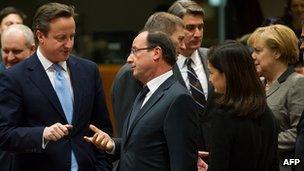David Cameron faces Europe test
- Published

Mr Cameron will promise an in/out referendum on the EU if the Conservatives win the election
A vote within the next five years on whether to get out of Europe or stay in on new terms. That is the pledge at the heart of the speech on Europe which David Cameron has so long agonised over.
Speaking in London and not in Amsterdam as originally planned, the prime minister will argue that a straight in or out referendum on our membership of the EU - like the one held in 1975 - should be held but not now or before the next election. David Cameron will argue that it should follow a renegotiation of the terms of British membership to create what he will call "a more flexible, adaptable and open European Union".
To those, no doubt led by UKIP's Nigel Farage, who warn that this is a promise without a deadline the prime minister will say that all this would happen by 2018 at the latest.
To those, like the Labour leader Ed Miliband, who argue that it will damage the British economy by raising doubts about Britain's future in Europe, David Cameron will reply that that uncertainty already exists.
The prime minister will insist once again today that he wants Britain to stay in the EU. His aides argue that his speech will enable the pro European case to be made. However, his speech could also lead to the European exit 45 years after we first joined - if, of course, that is what voters choose.
David Cameron's biggest claim will be that a referendum will settle the European issue once and for all. Harold Wilson's promise of renegotiation followed by a referendum split Labour down the middle in the 1970s and led to the creation of the breakaway SDP in the 1980s.
Since then Europe has contributed to the fall of Margaret Thatcher after years of fighting with her colleagues in the late 80s and the splitting of the Tory Party under John Major in the 90s. It was a source of the tension between Tony Blair and Gordon Brown well into the new millennium.
The test of this speech will be whether it makes it easier for David Cameron to live with and survive the issue that has proved more toxic than any other or whether it consumes him as it has his predecessors.